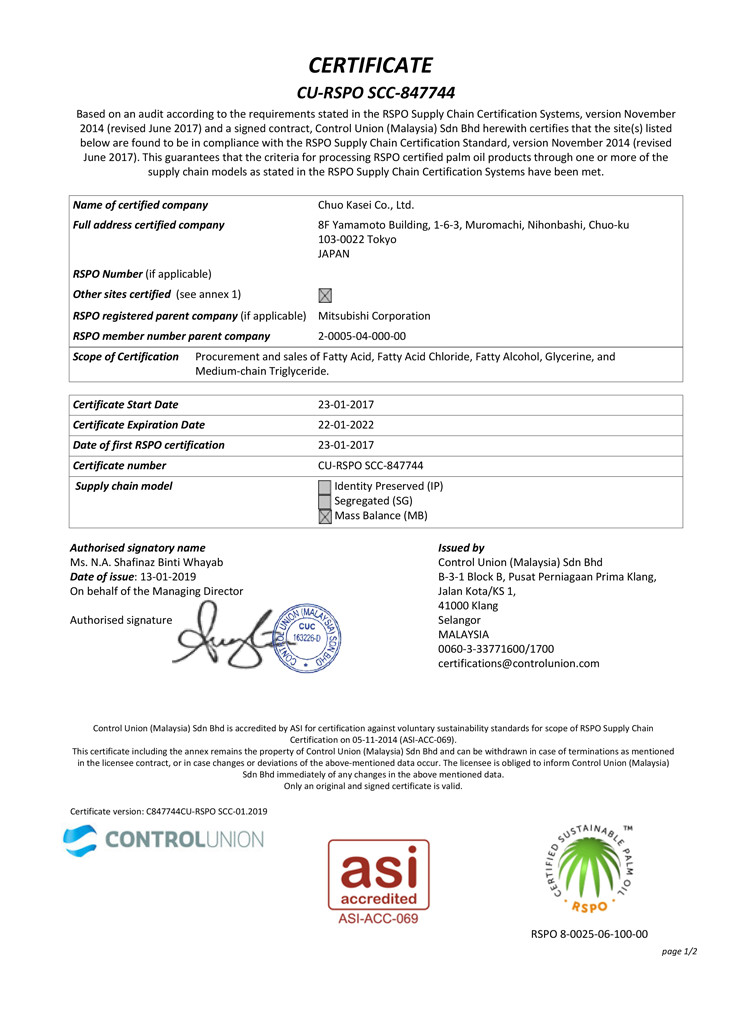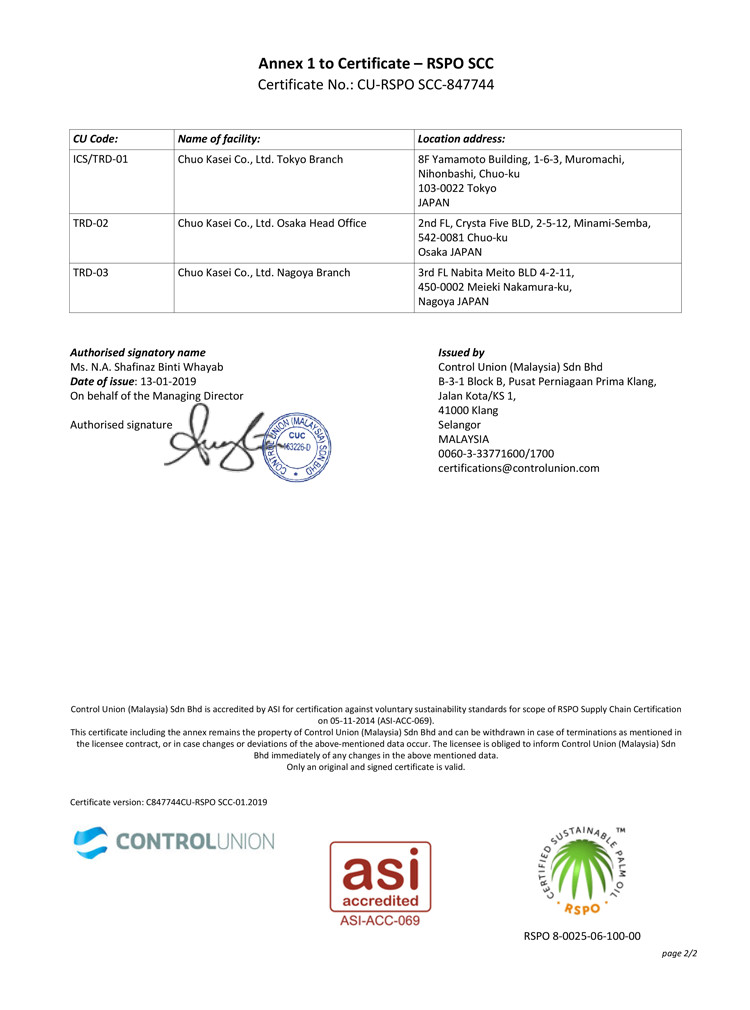ABOUT RSPO
CERTIFICATION

What is RSPO?
RSPO
RSPO stands for “Roundtable on Sustainable Palm Oil.” Chuo Kasei became a member of the organization in January of 2016.
People around the world have been increasingly concerned about the environmental impact of the rapid expansion of oil palm plantations. Against this backdrop, the RSPO was established in 2004 by related organizations including the WWF (Worldwide Fund for Nature). The purpose of the RSPO is to promote the production and use of sustainable palm oil. It is a nonprofit organization that operates in cooperation with related parties in seven sectors* related to the palm oil industry.
* Palm oil production, oil extraction and trade, consumer product manufacturing, retail, banking and financial companies, environmental NGOs, and society/development-related NGOs.

Principles and Criteria
PRINCIPLES AND
CRITERIA
RSPO’s vision for sustainable palm oil production is more than simply not violating relevant legal systems; it must also be economically sustainable, environmentally appropriate, and socially beneficial. These conditions are defined in RSPO’s Principles and Criteria, which stipulate eight principles and forty-three criteria and include specific indices and guidance for each individual standard. For new development, for example, development is prohibited not only for virgin forests but also for secondary growth forests if they are protected natural areas or if they are important places in the lives of local residents. The details of the principles and criteria are reviewed every five years in order to keep up with circumstantial changes.
- 1
- Behave ethically and transparently
- 2
- Operate legally and respect rights
- 3
- Optimize productivity, efficiency, positive impacts, and resilience
- 4
- Respect community and human rights and deliver benefits
- 5
- Support small shareholder inclusion
- 6
- Respect workers’ rights and conditions
- 7
- Protect, conserve, and enhance ecosystems and the environment
Now that We’re Part of RSPO…
By obtaining certification every process starting from the oil palm plantation all the way through the final product, members of RSPO can use the chain of custody across all processes to trace the palm oil used in final products.
For that reason, RSPO has established two certification systems: P&C Certification for the production stage, which certifies that sustainable production is taking place according to the Principles and Criteria (P&C), and SCC Certification, which certifies that a system is established to ensure that throughout every stage in the supply chain, certified palm oil is handed over without error.
In both systems, certification is performed by an accredited third-party RSPO certification body, rather than direct inspection/certification by RSPO. The inspection results are sent to the RSPO office, and a summary is uploaded to its website and made available for public comment for thirty days. Certification is valid for a period of five years, but the state of compliance is checked on a yearly basis, and in some cases, the certification can even be invalidated within the validity period.
It may seem like obtaining SCC certification itself is the goal for corporate users of palm oil in Japan, but the RSPO logo mark can only be used on products that are certified and that use certified palm oil.
-
1Production Stage Certification
(P&C Certification)The basic unit of certification for the production site includes the palm oil extraction factory (mill) and all directly managed plantations, contracted plantations, and independent plantations involved in providing palm fruit clusters. Inspection is performed by a minimum of three inspectors from an accredited RSPO certification body, who focus mainly on the eight principles and forty-three standards. It takes place over two sessions; in the first, inspectors point out gaps between the reality and the standards, and in the second, they mainly check the state of improvement.
-
2Supply Chain Certification
(SCC Certification)Supply Chain Certification is a system that certifies that the production, processing, and distribution processes involved in handling products made with certified palm oil actually meet the required standards for SCC Certification. The trading companies that stock certified palm oil from overseas, the corporations that process the oil, the manufacturers that make these products, and every stage in the process until the final product is finished are all subject to inspection in order for organizations that have SCC-certified products to obtain certification.
The Four Supply Chain Models
RSPO has three certification models and one securitization model to reflect the complexity of the palm oil supply chain. Chuo Kasei obtained Mass Balance (MB) certification in January 2017.
-
1 Identity Preserved (IP)
A certification model that makes it possible to identify the plantation from which certified palm oil was obtained by keeping it completely separated from other palm oils, from the palm oil production site all the way to the stage of final product manufacturing.
-
2Segregation (SG)
A certification model for plantations that have multiple types of certification to ensure that certified palm oil is not mixed with uncertified palm oil and that only certified palm oil is provided to the manufacturer. While it is not possible to identify one single plantation of production, this model does ensure that the materials are produced by certified plantations.
-
3Mass Balance (MB)
A certification model wherein certified palm oil from certified plantations is mixed with uncertified palm oils during the distribution process. While the products do physically contain uncertified palm oil as well, this model guarantees that the palm oil was produced by certified plantations and that a certain quantity of certified palm oil is used.
-
4Book & Claim (B&C)
In contrast to the other three methods, which involve the physical transfer of certified palm oil, this is an electronic and green model where there is an online transaction for a certified palm oil certificate between the palm oil producer, the final product manufacturer, and the seller. This way, it is still possible to directly support producers of certified palm oil even when procurement is not feasible because the supply chain does not yet have an established framework for certified palm oil. However, this model is positioned as a temporary mechanism until it is possible to handle certified palm oil in the future.
(Refer to WWF JAPAN)
With a full understanding of the principles and standards of RSPO, Chuo Kasei will work to promote the use of sustainable palm oil
(and of sustainable palm oil production).

